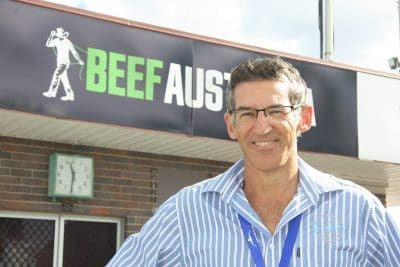ARCADIAN has branched into aggregating carbon credits on behalf of Australian grassfed beef producers, including some from its base of 80 organic suppliers.
 Dubbed the Beef Cattle Herd Aggregation, it has come to the market in time for BEEF 2021, where Arcadian marketing director Paul da Silva spoke about it in Australian Organic Ltd’s Emerging market opportunities – Organic Livestock Marketing Demystified session.
Dubbed the Beef Cattle Herd Aggregation, it has come to the market in time for BEEF 2021, where Arcadian marketing director Paul da Silva spoke about it in Australian Organic Ltd’s Emerging market opportunities – Organic Livestock Marketing Demystified session.
Arcadian is one of the world’s largest organic beef producers, with domestic and export customers.
Mr da Silva said launching the aggregation was a natural progression for Arcadian, the Toowoomba-based business which in 2019 made the decision to become carbon neutral.
“The next logical step was how to reduce our emissions footprint,” Mr da Silva said.
Mr da Silva said early indications are that ACCUs produced through the Arcadian aggregation are in demand.
“We have already been approached by a couple of organisations to say they specifically want carbon credits we would be generating, and did we have carbon credits in Queensland; it was that specific.”
Registered fund
The aim of the Arcadian aggregation is to generate Australian Carbon Credit Units (ACCU) on behalf of organic and conventional beef producers.
“We have established as an aggregator, and that allows any grassfed cattle producer to join our project without carrying the cost of establishing the project.”
Arcadian will cover the administration costs of the fund by charging producers a percentage of the value of any ACCUs generated.
The Arcadian aggregation has already registered with the Emissions Reduction Fund (ERF) as administered by the Federal Government’s Clean Energy Regulator.
Mr da Silva said producers keen to join the aggregation may well be able to monetise goals they were already pursuing.
These include getting cattle to turn-off weights at faster rates, and reducing the proportion of unproductive animals in the herd
“Those objectives are pretty much all objectives of beef cattle producers anyway.”
“If you are able to reduce the life of the animal, or have some activity to reduce those emissions, you’re going to make a substantial contribution to reducing greenhouse gas emissions.”
“It’s like making a vehicle travel the same distance using less fuel.”
In order to prove a reduction in methane emissions per animal under this method, producers need first to quantify their baseline production, and Mr da Silva said Arcadian was available to help producers come on board.
Potential income stream
The ERF Herd Method calculates ACCUs based on animals spending less days making methane, or enteric emissions.
Methane is deemed to be roughly 28 times more potent as a greenhouse gas than carbon dioxide, and ACCUs represent a greenhouse gas-emissions saving of one tonne of carbon dioxide equivalent.
ACCUs are issued annually by the ERF, and can be traded at any time.
“They have a dollar value and that dollar value is increasing.”
On April 29, ACCUs were trading at $18.35.
ACCUs are sought by those wishing to offset carbon emission in Australia or overseas, and can be held as an investment or offset by their producers.
Cattle not land
While ACCUs can be generated by land not in agricultural production, Mr da Silva is at pains to say that was not Arcadian’s model.
“It’s not about locking up country.”
“Producers taking part can use all their property, and they can use it how they please.”
Mr da Silva said while some projects based on soil and vegetation metrics had been well publicised as a source of ACCUs, Arcadian’s objective was different.
“It is not land based; it is based around the animal.”
“Theoretically there’s no minimum size for participation.”
Eyes on Europe
Sustainability credentials are already powerful marketing tools for agricultural produce going into some markets including Europe.
It is moving towards introduce a Carbon Border Adjustment Mechanism (CBAM), which will put a carbon price on some goods imported by the EU.
“If you want to access that market, and you do not come from jurisdictions with emissions management, they will force you to buy carbon credits at the market rate in Europe.”
“It’s very prudent to act fast.”
